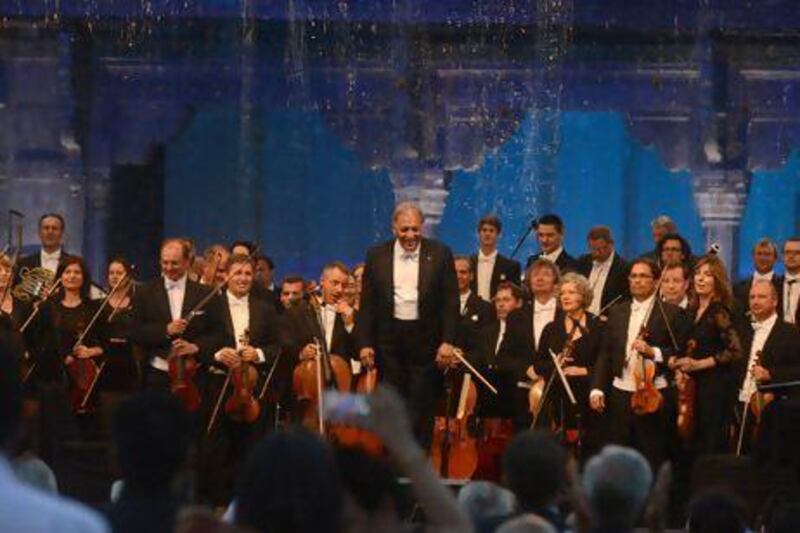SRINAGAR, INDIA // The celebrated orchestra conductor, Zubin Mehta, led the Bavarian State Orchestra in a classical music concert yesterday in disputed Indian Kashmir despite strong objections from separatist leaders.
The heavily guarded event was staged in the sprawling Mughal-era Shalimar Gardens on the banks of picturesque Dal Lake in Kashmir's summer capital of Srinagar.
"Everybody on the subcontinent will agree with me that this is where it should be," the Mumbai-born Mehta said, referring to the beautiful setting with the Himalayan mountains in the background.
"I have waited and dreamt of this moment," Mehta, 77, a former director of the Berlin Philharmonic Orchestra, told the audience in the bright late afternoon sunshine before taking up his baton.
About 1,500 invited guests, including government ministers and diplomats, listened to the strains of Beethoven, Haydn and Tchaikovsky at the concert organised by Indian Kashmir's state tourism department and the German embassy in New Delhi.
While the Shalimar Gardens event was an invitation-only affair, Mehta said he hoped to return to Kashmir and give a concert where "everybody can come".
The concert, named "Ehsaas-e-Kashmir" or "Feelings for Kashmir", was televised around the world.
It went ahead despite demands by separatists for its cancellation on grounds it would legitimise Indian "state repression" in the insurgency-hit region.
The concert was staged against the backdrop of a rise in bloodshed in the Muslim-majority territory where there has been a wave of clashes between militants and Indian forces in recent weeks.
There also have been deadly outbreaks of violence along the contested border between Indian and Pakistani forces.
Police said four men were shot dead yesterday in Shopian town by troops.
Indian media said the men were suspected of attempting to attack a security camp but officials would not comment on the reports.
Residents described the men as civilians who were shot by troops as they rode past the security camp on a motorcycle.
The Kashmir chief minister, Omar Abdullah, told the concert audience that Kashmir was a "troubled" land "yearning for peace".
"But for a few hours let us allow the music to lift our spirits and dream of a peaceful tomorrow," Mr Abdullah said.
Hardline separatist leader Syed Ali Geelani called a strike yesterday to protest the concert. Shops, businesses and colleges closed in several Kashmir cities.
A little-known rebel group threatened to "target foreign tourists" if the concert went ahead.
Extra checkpoints were set up throughout Srinagar and police sealed all routes to the concert as part of the security.
A parallel concert of Kashmiri music was staged by civil society activists to highlight alleged rights violations by security forces.
As the audience exited from that concert, they shouted anti-India slogans and police used a water cannon to disperse them.
A police spokesman said policemen used "limited force" because they feared a "law and order problem".
Tens of thousands of people, mainly civilians, have died since the start of the separatist insurgency in 1989.
Kashmir has been divided between India and Pakistan since their 1947 independence from Britain and has been the trigger of two of their three wars.
Mehta, a Parsee, left Mumbai at 18 to study music in Vienna. He had said he fell in love with scenic Kashmir on a visit with his family in the 1970s.
"Music is the only language I know and I hope to spread the message of peace with this performance," Mehta said.
* Agence France-Presse





